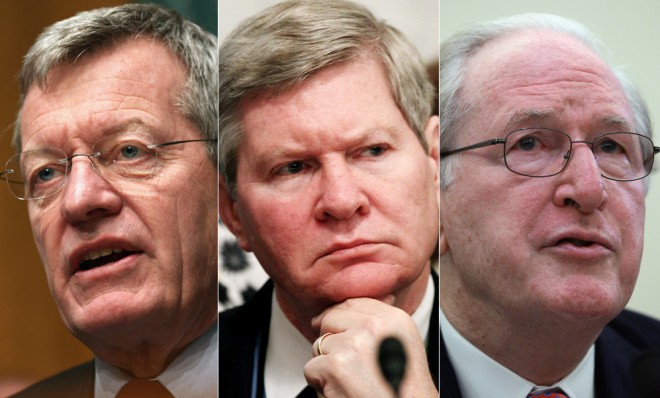Are Republicans poised to reclaim the Senate?
A handful of Democratic retirements and a favorable map could help the GOP flip the Senate next year


A free daily email with the biggest news stories of the day – and the best features from TheWeek.com
You are now subscribed
Your newsletter sign-up was successful
Montana Gov. Brian Schweitzer (D) announced over the weekend that he would not run for the U.S. Senate next year, leaving Democrats without a strong candidate in that race and making it less likely they can hold on to the seat once Sen. Max Baucus (D) retires.
It's the latest spot of bad news for Democrats, who had already been looking at a tough 2014 election cycle. In a year when the party will have to play defense, Schweitzer's decision to sit out has presented the GOP with an easier path to reclaiming control of the upper chamber.
As it stands, Democrats hold a 54-46 edge in the Senate. That should tick up to 55-45 if a Democratic candidate, as expected, wins the New Jersey special election in October to replace the late Sen. Frank Lautenberg, a Democrat whose vacant seat was filled by a Republican appointed by Gov. Chris Christie. That means Republicans would need to flip six seats while retaining all of their own to reclaim the majority.
The Week
Escape your echo chamber. Get the facts behind the news, plus analysis from multiple perspectives.

Sign up for The Week's Free Newsletters
From our morning news briefing to a weekly Good News Newsletter, get the best of The Week delivered directly to your inbox.
From our morning news briefing to a weekly Good News Newsletter, get the best of The Week delivered directly to your inbox.
It may sound like a tall order, but it's entirely possible. Democrats hold 20 of the 35 seats up for grabs next year — and should hold 21 after that special election — meaning Republicans have more opportunities to bring new seats into their column. Adding to Democrats' woes, five of the party's incumbent senators are retiring, including three from states with strong Republican leanings.
In West Virginia and South Dakota, the retirements of Sens. Jay Rockefeller and Tim Johnson, respectively, have given Republicans a 95 percent chance of claiming each seat, according to polling guru Nate Silver's forecast at The New York Times.
Schweitzer's latest announcement was "arguably the biggest development in the race for the Senate," according to political forecaster Larry Sabato, because Schweitzer was actually more popular than the incumbent he would have been running to replace. By declining to run, he turned what would have been a slightly Democratic-leaning race into one now leaning in favor of Republicans, Sabato said.
Silver's model, too, projected that Republicans had a 75 percent chance to capture that seat. That was enough for Silver to tip his overall Senate forecast just enough to favor Republicans.
A free daily email with the biggest news stories of the day – and the best features from TheWeek.com
A race-by-race analysis of the Senate, in fact, suggests that Republicans might now be close to even-money to win control of the chamber after next year's elections. Our best guess, after assigning probabilities of the likelihood of a G.O.P. pickup in each state, is that Republicans will end up with somewhere between 50 and 51 Senate seats after 2014, putting them right on the threshold of a majority. [New York Times]
Aside from the three races mentioned above, Silver's model rated three other seats — in North Carolina, Louisiana, and Arkansas — as toss-ups, with Alaska listed as another potentially close call. Democrats hold all of those Senate seats.
The prospect of close re-election fights may partly explain why some of the Democrats up for re-election have bucked their party on key issues this year. Sen. Mark Pryor (Ark.) and Sen. Mary Landrieu (La.) are two of only three Democratic senators to not support same-sex marriage. Pryor and Sen. Mark Begich (Alaska) were two of just four Democrats to vote against the bipartisan background check bill on guns.
With a year to go before voters head to the polls, anything could happen to shake up the dynamics of those races. A change in President Obama's approval rating, or the nomination of a controversial candidate in a fractious primary — think of Republican Todd Akin of Missouri, whose remarks about "legitimate rape" derailed his U.S. Senate campaign last year — could dramatically alter the picture.
Alaska, for instance, would be a much tougher Republican win if Sarah Palin does get in the race after all.
Jon Terbush is an associate editor at TheWeek.com covering politics, sports, and other things he finds interesting. He has previously written for Talking Points Memo, Raw Story, and Business Insider.
